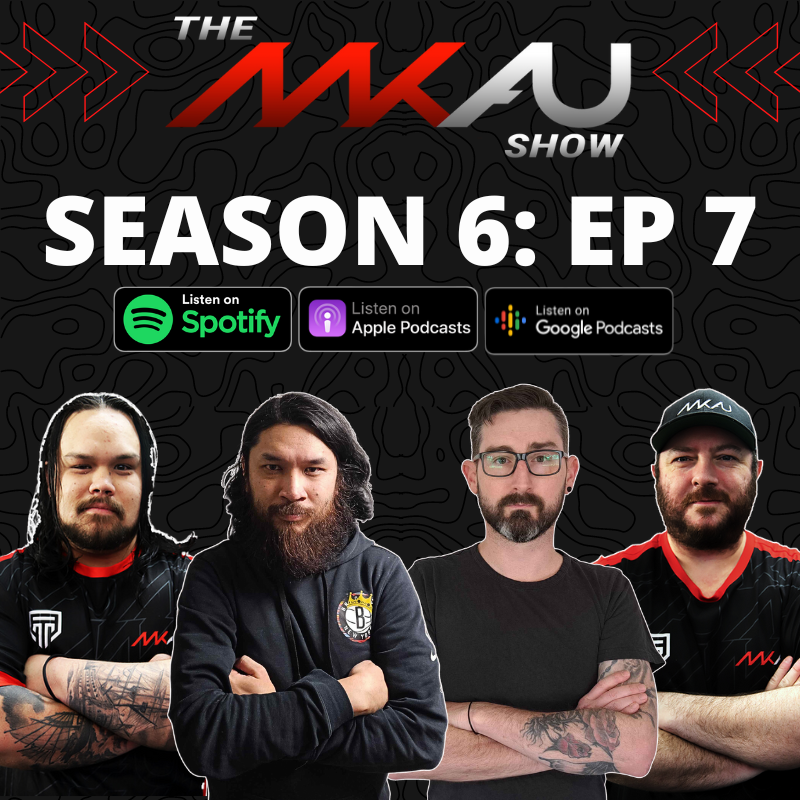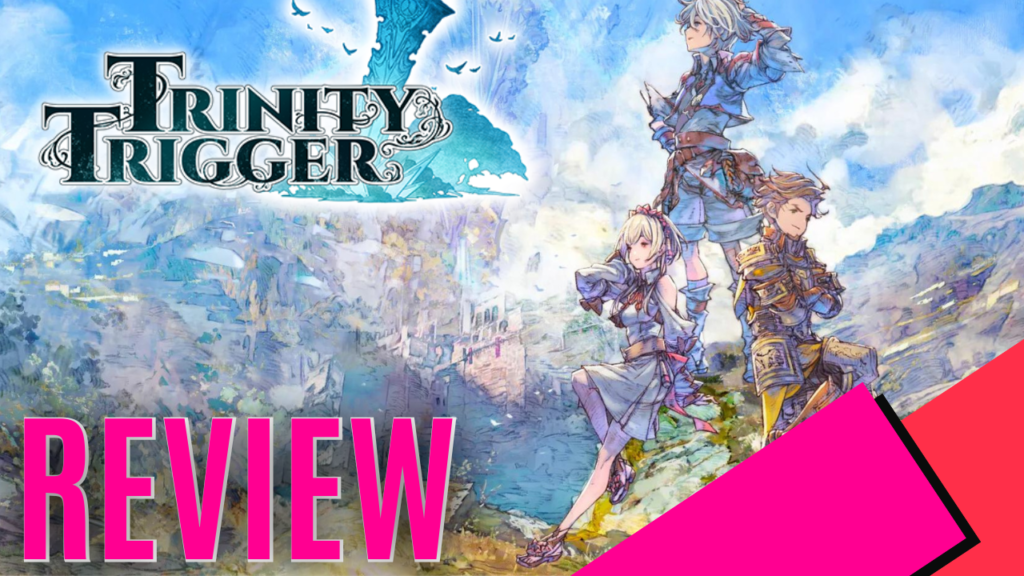
Remember way back in the day, chilling out after school and indulging in a lovely little action-JRPG? There was an indescribable feeling of wonderment during the first playthrough and a desire to experience them for the first time over and over again. The devs at Three Rings, working alongside publisher, Xseed Games, seek to revive the nostalgia for the 90s classics with Trinity Trigger, freshly released on Nintendo Switch. Though it seeks to be its own adventure, it feels familiar in a way that doesn’t quite hit where it should.
The fantasy world of Trinitia works within the will of the gods in their ongoing conflict – the Gods of War versus the Gods of Chaos. These beings choose a champion to represent them in their efforts to reign supreme. Cyan, a fairly young man with typical JRPG fashion sense, is one of these said champions. The telltale sign – a red eye with a strange insignia in it, branding him as a champion for the Gods of Chaos.
In the traditional JRPG style, Cyan is unaware of his heritage and is making do by providing for himself and his sister-type figure by scavenging and hacking through enemies beyond the village. During his daily grind, he encounters Flamme, a cute creature resembling some kind of Pikachu-like bunny/fox hybrid that can morph into various weapons. These creatures, known as Triggers, will become our personal morphing arsenal throughout our journey. Shortly after another encounter with a mysterious stranger, Cyan begins gathering a party, setting off to challenge their destinies.
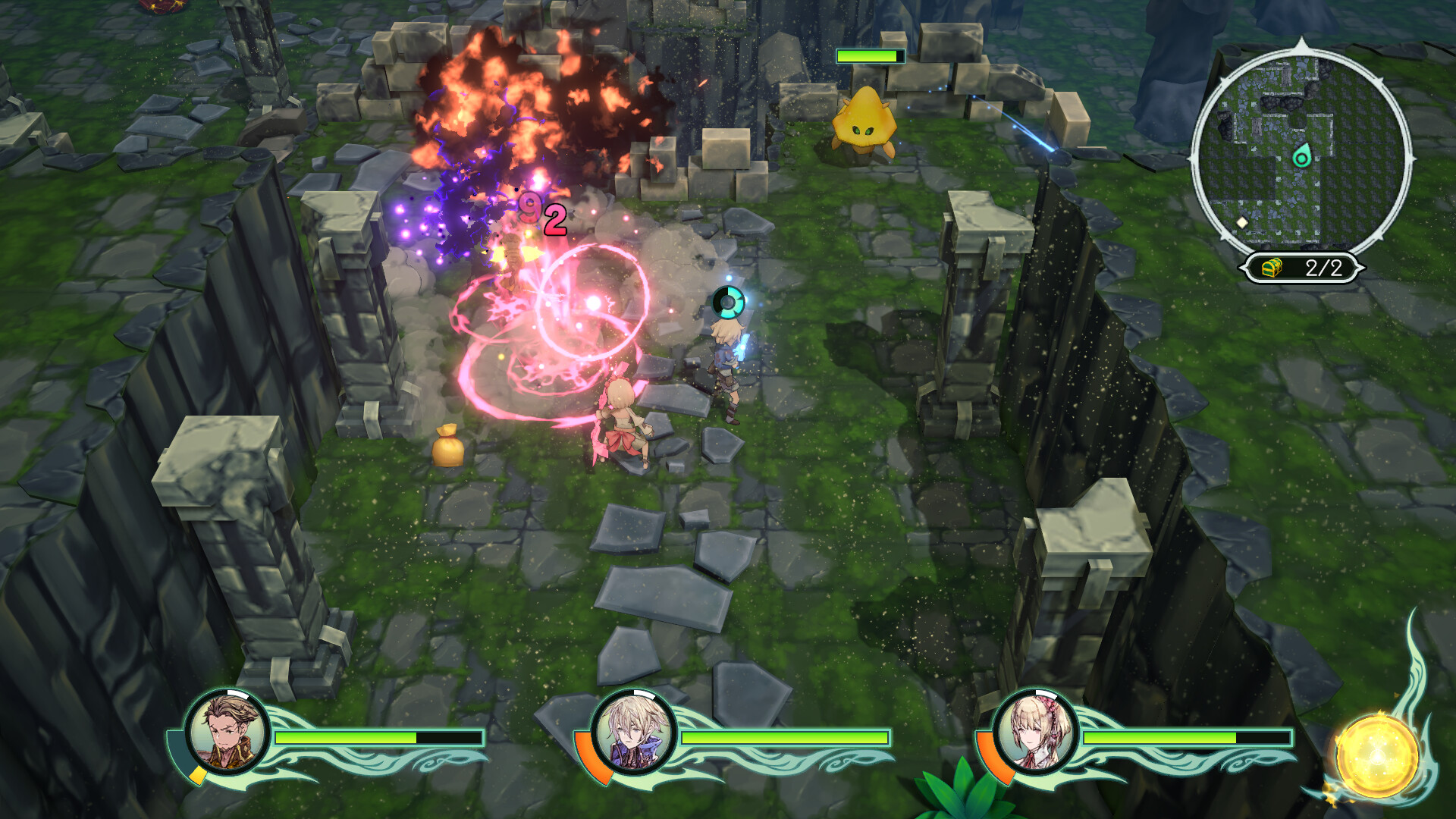
The return to form is always going to be warmly welcomed by JRPG aficionados, but Trinity Trigger does little to break away from the tropes of the genre in a way that doesn’t make the return feel satisfying. The game is somewhat reminiscent of Secret of Mana, one of their main inspirations even bringing Yuki Nobuteru, the actual writer of this classic for world-building. Unfortunately, the world is pretty standard fare with very little differentiating this in-game universe from others, with cliche heroes, quests, and lore.
I explored different biomes including forests, snowfields, and deserts, each with loot to find and foes to slay. Thankfully, exploration isn’t too taxing with a super-fast sprint and virtually no stamina depletion. Early on, fast-travel shrines are unlocked, which I most definitely needed to restock on potions, selling, and crafting. Most of the main quest line involves going from point A to B with the occasional fetch quest thrown into the mix. There wasn’t much time to appreciate areas before moving on to the next.
As expected, there are plenty of dungeons, but they look and feel the same. Navigating dungeons and their puzzles was relatively easy with minimal payoff. End Bosses dragged out with a constantly refilling stun bar and predictable attack patterns. Unfortunately, they were mostly difficult due to how dopey allies could be; standing in the line of fire taking damage, and resulting in a constant effort to chug enough potions to keep them going. It’s rinse and repeat. Very little in the way of tactics are needed to take them out. The struggle is just sheer monotony. Active combat leaves little room for strategy in Trinity Trigger; spam to what the combat bar allows and roll away when enemies go for a hit.
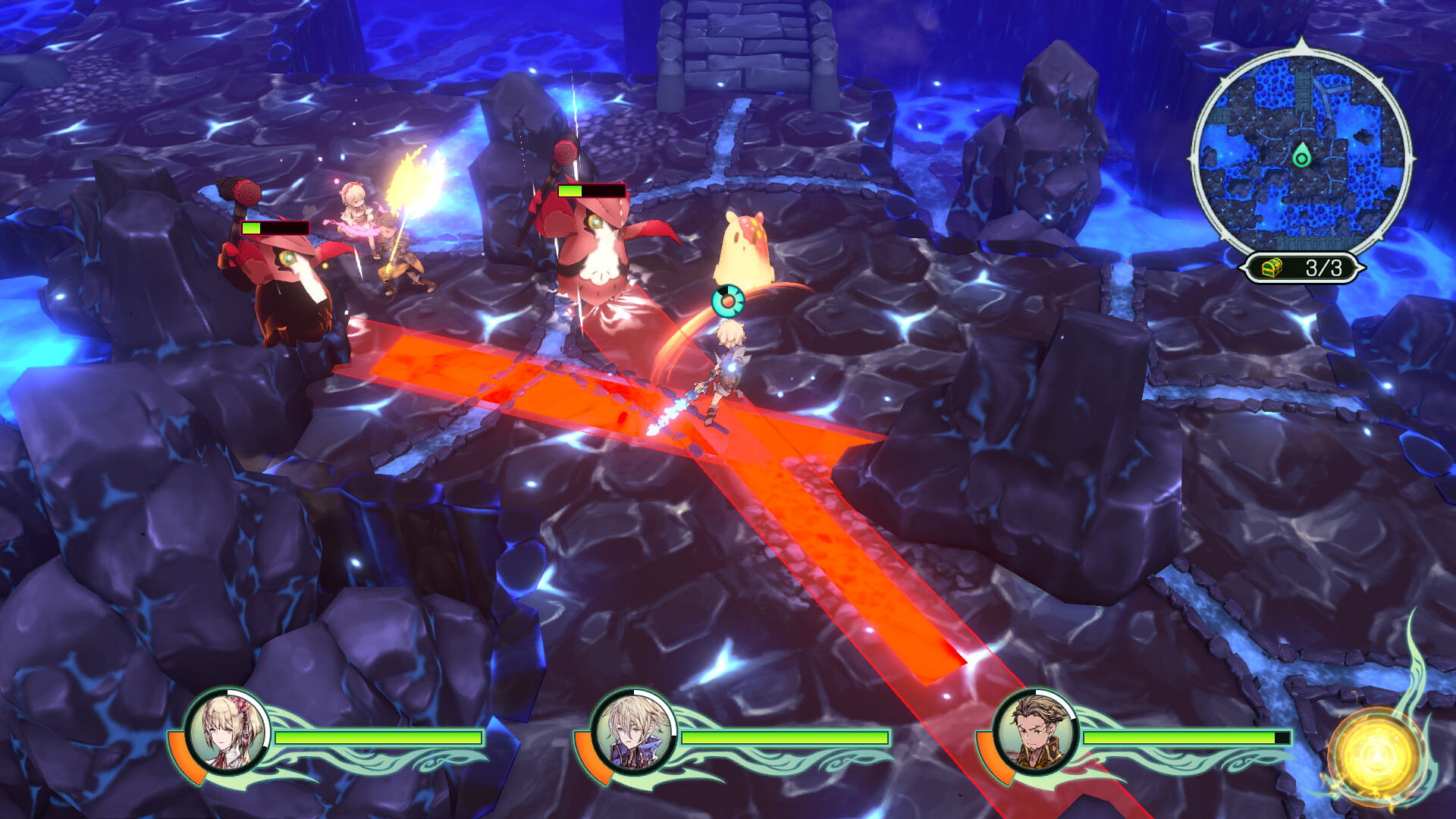
It doesn’t take long to meet up with the other two party members joining Cyan, and I’d love to say they help, but they’re usually more of a hindrance. The option to freely swap between them made combat feel slightly more dynamic, but the most useful part was being able to do the Trinity Impact – combining their powers for a full-on barrage. For the proper party experience, there’s the chance to play co-op if all three characters are unlocked, which, if you want a smart party, is the way to go.
Controls are intuitive and the tutorials give enough guidance to jump straight in without being drawn out. Menus are easy to access and radials are smooth in combat, temporarily pausing while selecting potions and weapons. They don’t feel the need to overcomplicate mechanics, but the simplicity doesn’t strike a balance between too much and too little. For those new to JRPGs, it’s a glimpse into the genre and is a good starting point for younger players to get into action-adventure titles. There are no difficulty settings, nor is there a need to be based on the gameplay loop. Clocking in at around 15-20 hours, it’s by no means as time-consuming as most JRPGs and is easy to breeze through – if you can stay invested. I had no noticeable performance issues or drops during my time in Trinitia, handheld and docked, and the load times were almost instantaneous, thankfully, considering frequent dialogue cutscenes and fast-travel.
Graphically, everything looked crisp on both screens, however, there were questionable design choices when it came to visuals. Playing from a semi top-down 3D view works well, providing you with an aerial view of the world and its bright colour palette. In-game, characters were chibi-like with cel-shaded outlines around them, which made props and scenes stand out for the wrong reasons. Some textures were uber-detailed, but seemingly at random, and some interiors or props appear blurry and low-poly whether intentional or not. The inconsistency in style is even more noticeable when returning from cinematics.
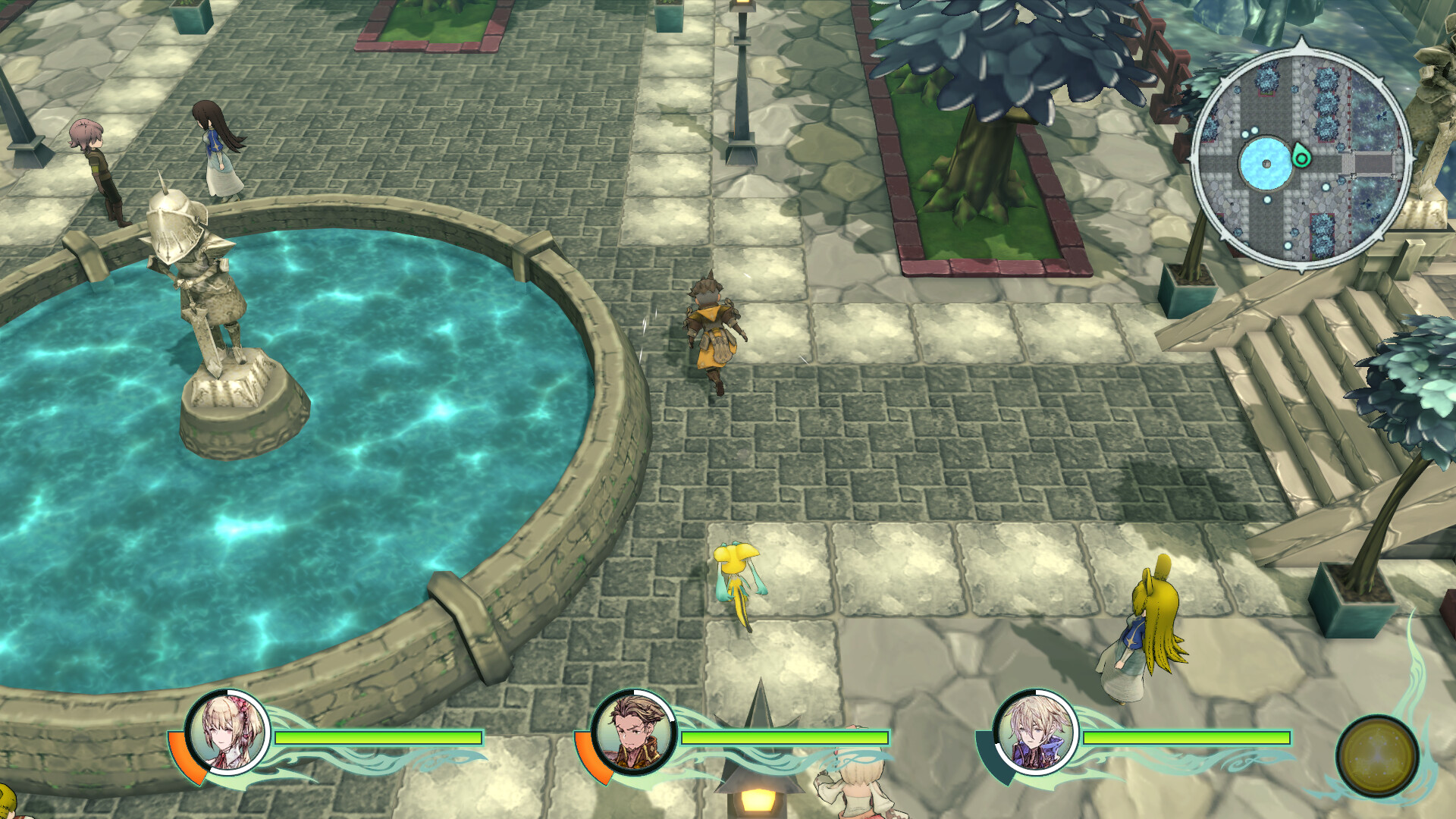
These cutscenes were stunning, like watching an anime with a cute, sketched animation, but unfortunately these last mere moments, roughly 15-20 seconds each – it was a huge missed opportunity. Character portraits resemble those of Octopath Traveller, with the actual artist, Yura Kabota reprising that art style here. Bringing in industry heavy hitters brought a level of polish in some areas, but leaves Trinity Trigger with a case of mistaken identity in any areas these creators aren’t involved due to a massive quality drop.
Another industry champion, Kikuta Hiroki, the composer for Secret of Mana, brings in sweeping orchestral tracks that enhance the fantasy element. Voice acting is top-notch with a surprisingly well-done English dub (and Japanese support), but conversations can be wordy, so it’s mighty tempting to skip through the rambling. My biggest audio pet peeve was repetitive sound effects while swinging weapons, with each character constantly cycling between the same 3 or so voice lines and grunts. Overall music is stunning, but the sound effects are very hit-and-miss.
Trinity Trigger is a decent love letter to 90s games, but it doesn’t seem to be able to find its place among the stars. As a Switch title, it’s good for a low-key gaming session, but it was not as captivating as I would like. Trinity Trigger doesn’t capture the essence of those classic JRPGs that make them memorable. It’s a decent but forgettable journey, but one that for me, was short-lived.

The Good
- Makes some modern quality of life improvements for JRPGs
- Stunning cutscenes, character portraits and decent in-game visuals
- Great voice acting and beautiful soundtrack
The Bad
- Unoriginal, overdone JRPG gameplay and story
- Combat is long-winded and repetitive
- Very exposition heavy
- Lots of go from A to B gameplay








